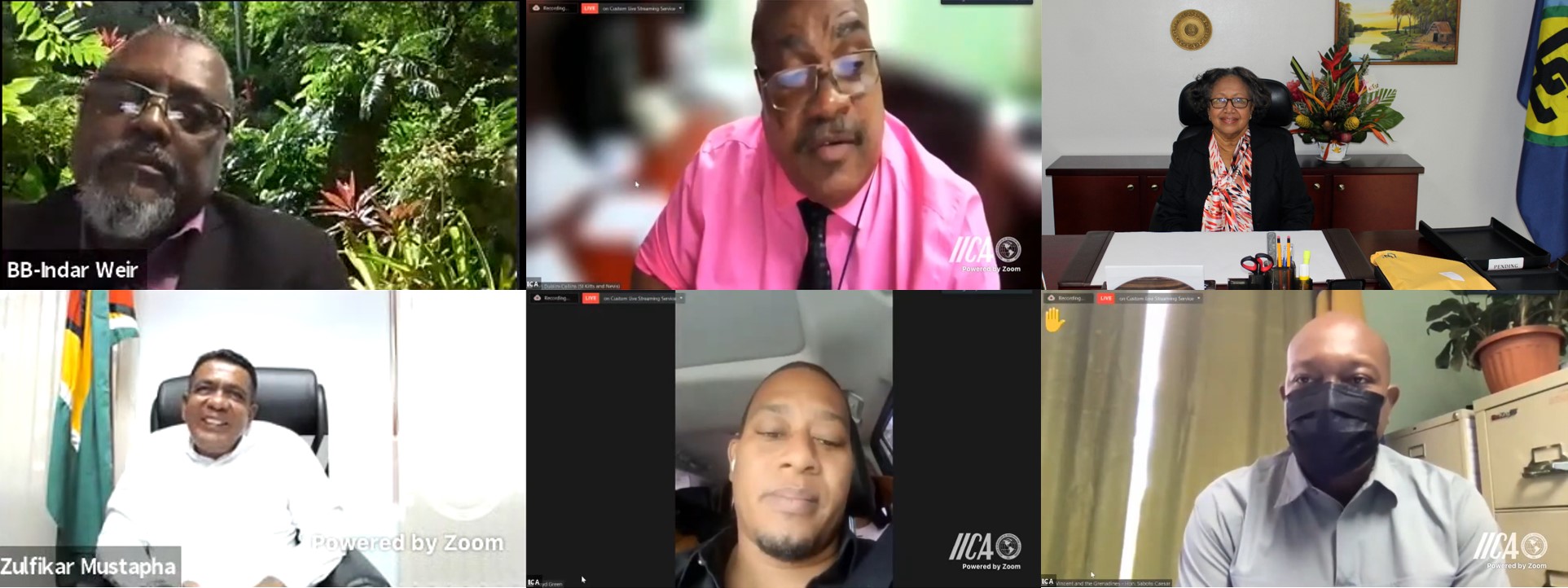The Ministers of Agriculture of 14 nations in that region—who along with their other counterparts in the Americas, were attending the Conference of Ministers of Agriculture of the Americas 2021—committed to transforming and increasing the resilience of their agrifood systems to the challenges they face, due to their vulnerability to climate change-related natural disasters.

San Jose, 6 September 2021 (IICA). The Caribbean nations are committed to building the resilience of their agrifood systems to tackle the challenges they face, due to their vulnerability to climate-change related natural disasters, according to ministers from the region.
These high-level authorities from 14 nations in the region met with their peers in the wider American hemisphere at the Conference of Ministers of Agriculture 2021, which was held virtually, under the theme of “Sustainable Agrifood Systems, the Engine of Development of the Americas”.
“The world is facing many challenges and the Americas has its own challenges. Specifically, we in the Caribbean need to build greater resilience to climate-change related natural disasters”, said Indar Weir, Minister of Agriculture and Food Security of Barbados.
“In Barbados”, he added, “this year we have had to endure the passage of Hurricane Elsa and we are still in the hurricane season, so we must ensure that the entire Caribbean is protected”.
Weir thanked the Inter-American Institute for Cooperation on Agriculture (IICA) for its work to achieve agricultural sustainability in the Caribbean and commended the Director General, Manuel Otero, for his re-election to head the organization for a second term.
Ron Dublin-Collins, Permanent Secretary in the Ministry of Agriculture of Saint Kitts and Nevis, explained that his country is seeking to transform agriculture to better position the sector to ensure food security. He said that, “We are making every effort. We know that the sector faces challenges and hope to continue collaborating with countries in the region and with IICA. We embrace hope and know that we can achieve our objectives”.
Also participating in the Conference was Carla Barnett, Secretary-General of the Caribbean Community (CARICOM)—one of the strategic technical cooperation partners of IICA—who emphasized that the Caribbean nations are attempting to transform their agrifood systems, while also boosting production resilience, in a bid to achieve a 25% cut in the high level of food imports by 2025.
“Transforming agrifood systems will require funding from public and private entities and from national and international partners. To do so, we will need innovative financial instruments and investment models that allow us to introduce new technologies to small producers, so that they can begin to employ solar energy, hydroponics, aquaponics, smart greenhouses and water harvesting and storage”, said Barnett, who was making her first appearance at the ministerial meeting as Secretary-General of CARICOM.
Floyd Green, Minister of Agriculture and Fisheries of Jamaica, lamented the fact that his country’s productive sector suffered tremendous losses because of the passage of Tropical Storm Ida.
“Now is the time to work to transform agrifood systems and that is what the CARICOM member countries are doing. Climate change challenges are enormous”, he said, while expressing his appreciation for IICA’s contributions in assisting his country to introduce greater technological innovation to benefit small farmers.
“Our region is one of the most vulnerable to climate change and natural disasters in general”, remarked Zulfikar Mustapha, Minister of Agriculture of Guyana, a South American member country of CARICOM and the headquarters of that organization. “Our economies and production systems have suffered the impact of the volcano eruption in Saint Vincent and the Grenadines, the earthquake in Haiti and the floods in Guyana and Suriname that destroyed crops and animals. Now we are tackling an outbreak of African swine fever in the Dominican Republic. It is critical that we strengthen our agrifood systems”.
He also remarked that, “Our task is to create agriculture and tourism linkages and to develop public-private partnerships that allow us to implement climate-smart technology and digital agriculture. We need financing for climate mitigation and adaptation today more than ever. The support of IICA and other international institutions is imperative to ensure greater resilience”.
The Guyanese minister pointed that his country, with its vast tracts of agricultural land, is one of the guarantors of Caribbean food security and confirmed that lately the country has made headway in modernizing its production. “The challenges are many, but the conditions are within our reach”, he said.
Finally, the Minister of Agriculture, Forestry, Fisheries, Rural Transformation, Industry and Labor of Saint Vincent and the Grenadines, Saboto Caesar, congratulated the newly re-elected IICA Director General for his work to build agrifood system resilience in the hemisphere during the pandemic and expressed his commitment to building agricultural sustainability.
Saboto admitted that, “We know that much remains to be done and that things will not be easy from here forward. We will have to face daunting challenges as we push ahead to achieve the Sustainable Development Goals (SDGs) and Agenda 2030, but our aim is to guarantee the food security and sovereignty of our people”.
More information:
Institutional Communication Division.
comunicacion.institucional@iica.int











